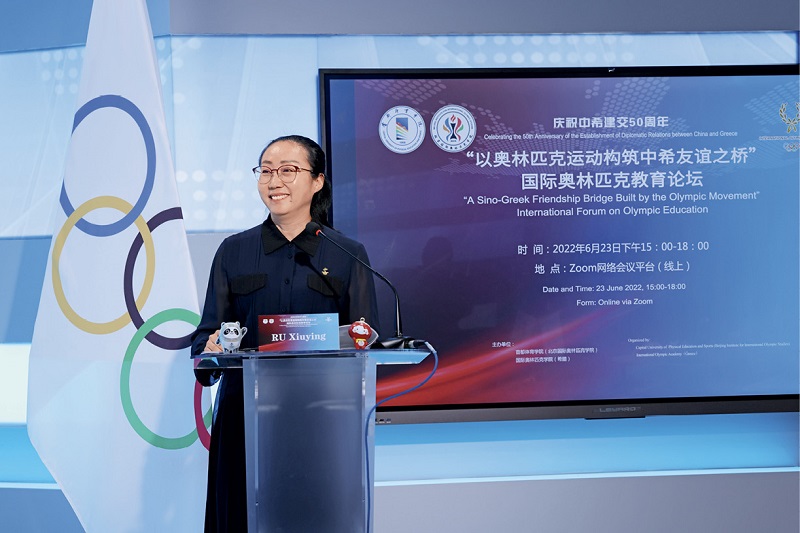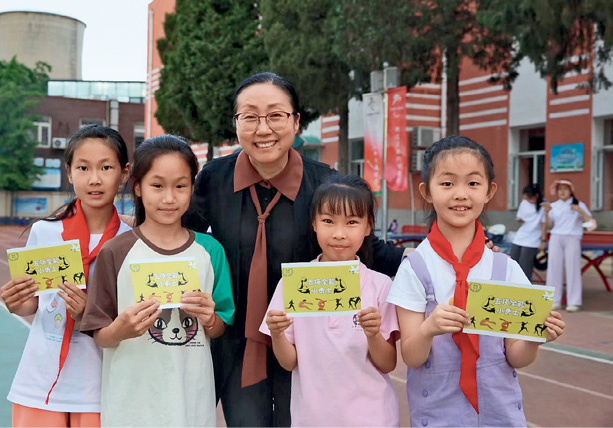An Olympic scholar is teaching the Olympic culture in schools so that youngsters learn perseverance, resilience and fair play.
The Paris 2024 Olympics and Paralympic Games are over but the Olympic movement continues in different countries in different ways, inspiring cultural activities and enabling professionals from different countries to exchange ideas and learn from each other’s successful sports education concepts and models.
Ru Xiuying is an Olympic scholar promoting Olympic culture. The director of the social sports teaching and research office at the Department of Leisure and Social Sports of Capital University of Physical Education and Sports, she considers sporting events to be also vital cultural and educational vehicles. The purpose of participating in the Olympics is not solely to compete for medals. “The Olympics are an educational activity, and their fundamental goal is to shape a harmonious individual,” she said. “This means balanced development of body and mind — to become a well-rounded individual. Harmonious individuals constitute a harmonious society, and a harmonious society helps to bring world peace.”

Professor Ru Xiuying speaks at an international forum on Olympic education on June 23, 2022.
Getting Schools Involved
Schools are an important platform for promoting sportsmanship. Three years ago, Ru formed an Olympic education team of graduates to develop a series of interdisciplinary courses on Olympic education for primary and secondary schools in China. The pilot courses have been carried out in some schools in Beijing. The Friday afternoon sessions at the Dianchang Road Primary School in Shijingshan, a district in Beijing, gives a good idea of what it is like.
The one-hour session is generally divided into two parts. First, the students are told about the Olympics, and for the next 45 minutes, they go outside the classroom for sports. It is a six-year collaboration with the school, and the new Olympic culture course is already part of the curriculum. “We’ve completed three semesters and are now in the fourth,” Ru said.
Last semester, the team told the children the history of the ancient Olympic Games and designed a mini ancient Olympics. “All the students took part. Through activities like this, children strengthen their bodies as well develop an awareness of fair play and perseverance. These qualities will have a lasting impact on their studies, work, and lives.”
Ru is committed to introducing Olympic knowledge in rural schools, ensuring that the children there have equal access to Olympic culture. “Sports can boost children’s confidence,” she said. “At first, they might be a bit shy, but after a few sports activities, we can see a marked improvement in their confidence and their willingness to express themselves.”
Olympic Cultural Exchanges
As an Olympic scholar, Ru has attended many Olympic-themed events in different countries, from the U.K. to Greece and the Republic of Korea. “When I first started attending these exchange activities over a decade ago, I noticed that in many countries, physical education classes were largely game-based. Those classes focused not only on learning skills or vying for medals but, more importantly, on fostering children’s interest in sports. The goal was to foster children’s interest in physical activities, often through teamwork, teaching them how to cooperate and communicate with others,” she said. Inspired by these ideas, she later integrated them into her own teaching methods.
In 2017, she formed China’s first Olympic education presentation team of graduates, and they made over 100 presentations on the Winter Olympics in different regions of China. As part of the preparation for the Beijing 2022 Winter Olympics, Ru developed seven sets of educational materials for different groups. One was “general knowledge of the Olympic sports,” which was included in the online training courses for the Beijing 2022 volunteers, who were mostly university graduates. After the conclusion of Beijing 2022, she produced an official report on the Games.
Each Olympic host city and nation enriches the Olympic culture in its own way. Beijing is the first city to hold both the Summer and Winter Olympic Games and has accumulated a rich Olympic legacy. In March 2024, Ru was invited to teach a graduate course on “Beijing’s dual Olympic legacy” at the Russian International Olympic University in Sochi, where she shared the experience of China’s Olympic development.

Ru Xiuying with students at the Dianchang Road Primary School.
Learning about Fair Play
“Sports play an irreplaceable role in cultivating positive values and good moral character in a person,” Ru said. The soul and foundation of sports lie in fair play. “The first thing that sports teach participants is awareness of fair competition. In a sport, any violation of rules leads to penalties. Athletes must follow the rules and respect the referees and opponents.”
She has an example from the Paris Olympics to illustrate this idea. “Chinese divers Quan Hongchan and Chen Yuxi are partners in the synchronized platform event, but in individual events, they become competitors. However, their relationship is consistently based on mutual respect and mutual support.” Ru emphasized that athletes are encouraged to strive for personal excellence on a level playing field.
Another important quality in sports is resilience and perseverance. How do you respond to a challenge? Give up or rise to it? She quoted the founder of the modern Olympics, Pierre de Coubertin: “The most important thing in the Olympic Games is not winning but taking part; the essential thing in life is not conquering but fighting well.”